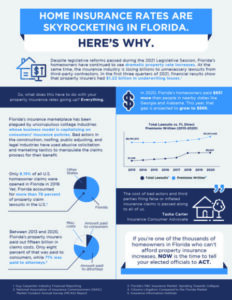Charges that home repair contractors and attorneys are teaming up to pad claims submitted to insurers will be the focus of debate for a third straight year in Tallahassee.
State lawmakers on the House Insurance Committee were scheduled Monday to discuss possible restrictions on allowing homeowners to sign over to home repair contractors their legal rights to bill insurers for damages, accept payments and file suits in disputes over claims.
Insurers and their allies charge that contractors, public adjustors and attorneys in South Florida have created a cottage industry by submitting inflated claims for repairs, mostly water leaks, then driving up legal fees by suing if insurance companies don’t pay the bills.
The practice has become a problem in South Florida, and especially Miami-Dade County, where water damage restoration companies are aggressively targeting homeowners with water damage, insurers argue.
They point to an October 2013 report from Citizens Property Insurance Co. stating that while Miami-Dade property owners make up 19 percent of all Citizens policies, they account for 35 percent of all non-sinkhole-related claims and 67 percent of claims that result in lawsuits. Another 26 percent of litigated claims originated in Broward and Palm Beach counties.
Sam Miller, executive vice president of the Florida Insurance Council, which lobbies for the insurance industry, said “inflated claims” by a group of water restoration companies in South Florida are keeping insurance rates high in Florida.
“Someone shows up following a fire and knocks on your door, saying, ‘We’ll take care of it but you have to sign over all your benefits,’ ” Miller said.
State Rep. David Santiago, R-Deltona, a member of the House Insurance and Banking Subcommittee, wrote an essay in January citing warnings by former Florida Insurance Consumer Advocate Robin Wescott that the issue is driving up homeowners’ insurance rates by 17 percent a year.
“In some parts of the state, claims settled with an assignment of benefits form averaged $32,000, nearly triple the amount of claims settled without one,” Santiago wrote.
Some homeowners have discovered that contractors placed liens on their homes after assigning their benefits, and contractors have taken payments from insurance companies and failed to complete repairs, Santiago said in an interview.
But Lee Jacobson, an Orlando-based civil litigation attorney and member of the Florida Justice Association, comprising trial attorneys, says insurance companies are raising the issue because “they don’t have anything else to blame higher rates on.” The Florida Justice Association was formerly called the Florida Trial Lawyers Association.
Jacobson said contractors ask policyholders to sign over benefits because insurance companies too often fail to pay up or cover the full cost of repairs. Insurers don’t like when contractors “expect to be paid for the work they performed,” he said.
“This is about them being sued for shorting claims time and again and facing dozens of lawsuits by the same companies,” he said.
Jacobson contends homeowners are often better served by allowing contractors and attorneys to negotiate with insurance companies because they are more likely to know how repairs are required under the law. For example, a homeowner might not be aware that state law requires an insurer to replace the entire roof of a home if just 25 percent of the roof is destroyed, he said.
Insurers’ efforts to restrict assignment of benefits “is a way to keep the playing field unfair,” Jacobson said. “It’s much easier to bully homeowners off their claim or into a lesser payment than if they’re dealing with someone who knows what they’re talking about.”
Eliminating assignment of benefits would result in contractors being unwilling to commence repairs without upfront payments, he said.
He noted that health and auto insurance policyholders routinely assign benefits to doctors and repair shops, but proposals to restrict the right are focused only on property insurance.
Ashley Carr, spokeswoman for the state Department of Financial Services, which investigates complaints of abuses by contractors, said the department does not have a record of complaints by homeowners that would back up the insurance industry’s contentions.
While misuse of assignment of benefits is a concern to consumers, “the breadth and scope of the problem are still coming into focus,” she said, adding, “We are looking to the insurance industry for more data.”
Efforts to restrict or eliminate assignment of benefits have failed twice before, in 2013 and 2014. Opponents argued that in 1907, the Florida Supreme Court affirmed the right of policyholders to assign a third party the right to collect claim benefits.
This year, insurers are likely to seek restrictions but won’t try to eliminate the right of policyholders to assign benefits, said Sam Miller of the Florida Insurance Council.
Safeguards that could reduce abuses might include a three-day “backout” period for policyholders, full disclosure of the potential that policyholders might be on the hook for the repair costs if insurers prevail in court and notification to insurance companies — before repairs commence — of policyholders signing over benefits, Miller said.
Santiago said possible remedies might involve keeping policyholders involved in the claim, allowing assignment of benefits tied to specific repair work, barring contractors from determining the cost of repairs or prohibiting contractors such as plumbers from getting paid to refer homeowners to other contractors.
Jacobson said that instead of restricting a basic right of policyholders, lawmakers should focus on restricting “bad actors” in the water damage restoration field.
Source: SunSentinel

